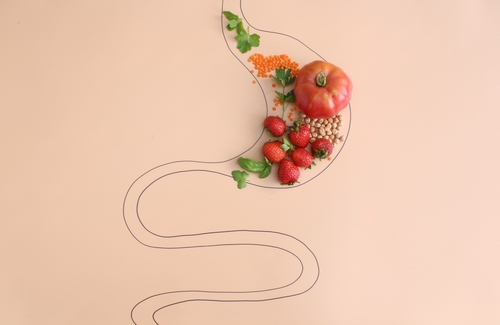It is interesting to note that our gut has its own universe. This cosmos is called the gut microbiome, and it contains microorganisms that contribute to and support our overall health. A disrupted microbiome may lead to several health problems. Thus, balance is important. What, then, drives this microbiome? A major player is prebiotic dietary fiber. Let us explore further details about it.
What is Prebiotic Fiber?
Prebiotic dietary fibers are a type of soluble fiber that our body cannot digest. It moves through the digestive tract and feeds the good bacteria in our gut.2
Unlike other types of fibre that support digestion by adding bulk to stool, prebiotics feed the probiotics, enhancing their growth function. While probiotics add beneficial bacteria to the gut, prebiotics help nourish them, making them more effective in supporting gut health. Foods like garlic, onions, bananas and whole grains are excellent sources of prebiotic fibers.2,3
The Role of Prebiotic Fiber in Gut Microbiome Health
Prebiotic fiber plays several roles in maintaining gut microbiome health, such as:2,4
Enhancing microbiome diversity: As our gut microbiome is made up of a plethora of microorganisms, prebiotic fiber further enhances this diversity. It supports the growth of a wide range of good bacteria. The more diverse the biome, the less overgrowth of dangerous bacteria. This results in a healthier gut ecosystem.
Support for Beneficial Bacteria: As prebiotic fiber feeds probiotics, it helps in boosting the population of existing beneficial microorganisms. These probiotics have several important roles, including breaking down food, generating key nutrients, and regulating inflammation.

Benefits of Prebiotic Fiber for Gut Health
Immune System Support: Our gut microbiome and immune system is connected. A healthy gut often means a healthy immune system, and prebiotic fiber helps in achieving that by
encouraging the growth of good bacteria, which influences the immune system’s ability to respond to infections and reduce inflammation.5
Reduced Inflammation: Chronic gut inflammation is often associated with digestive issues such as irritable bowel syndrome (IBS), Crohn’s disease, and ulcerative colitis. Prebiotics can help reduce inflammation by increasing the growth of anti-inflammatory microorganisms.6
Improved Bowel Health: The gut microbiome largely affects bowel movement frequency and overall bowel health. Prebiotic fiber improves bowel regularity by promoting good bacteria that create SCFAs, which support fluid absorption and bowel movement creation. People who suffer from constipation or other gastrointestinal disorders may notice that increasing their prebiotic fiber consumption provides relief and improves digestion.7
Impact on Digestion: When prebiotics are fermented by probiotics, it generates short-chain fatty acids (SCFAs). SCFAs lower inflammation, improve fat metabolism, has anti- inflammatory, antibacterial, and gut-protective properties. This promotes a more balanced digestive system, decreasing the chances of digestive disorders.8,9
How to Incorporate Prebiotic Fiber into Your Diet
The easiest way to increase the prebiotic fiber in your diet is to have meals rich in prebiotic fiber. You can add ingredients like garlic, onions, bananas and whole grains.2,3 But often, people fail to fulfil their prebiotic fiber goal, so supplementation becomes necessary.
Fructooligosaccharides (FOS), produced from natural plants, are a great prebiotic supplement option. Its powdered form makes it easy to add to your regular diet. Consultation with your nutritionist is always advised for a more personalised solution.10
References:
- The Microbiome. The Nutrition Source. Published August 16, 2017. https://nutritionsource.hsph.harvard.edu/microbiome/
- Davani-Davari D, Negahdaripour M, Karimzadeh I, et al. Prebiotics: Definition, Types, Sources, Mechanisms, and Clinical Applications. Foods. 2019;8(3):92. Published 2019 Mar 9. doi:10.3390/foods8030092
- Oluwatobi Victoria Obayomi, Abiola Folakemi Olaniran, Stephen Olugbemiga Owa. Unveiling the role of functional foods with emphasis on prebiotics and probiotics in human health: A review. Journal of functional foods. 2024;119:106337-106337. doi:https://doi.org/10.1016/j.jff.2024.106337
- What Are Prebiotics and What Do They Do? Cleveland Clinic. Published March 14, 2022. https://health.clevelandclinic.org/what-are-prebiotics
- Zheng D, Liwinski T, Elinav E. Interaction between microbiota and immunity in health and disease. Cell Research. 2020;30(6):492-506. doi:https://doi.org/10.1038/s41422-020- 0332-7
- Looijer-van Langen MA, Dieleman LA. Prebiotics in chronic intestinal inflammation.
Inflamm Bowel Dis. 2009;15(3):454-462. doi:10.1002/ibd.20737
- Slavin J. Fiber and prebiotics: mechanisms and health benefits. Nutrients. 2013;5(4):1417- 1435. Published 2013 Apr 22. doi:10.3390/nu5041417
- Shin Y, Han S, Kwon J, et al. Roles of Short-Chain Fatty Acids in Inflammatory Bowel Disease. Nutrients. 2023;15(20):4466. Published 2023 Oct 21. doi:10.3390/nu15204466
- Akhtar M, Chen Y, Ma Z, et al. Gut microbiota-derived short chain fatty acids are potential mediators in gut inflammation. Anim Nutr. 2021;8:350-360. Published 2021 Dec 29. doi:10.1016/j.aninu.2021.11.005
- Dou Y, Yu X, Luo Y, Chen B, Ma D, Zhu J. Effect of Fructooligosaccharides Supplementation on the Gut Microbiota in Human: A Systematic Review and Meta- Analysis. Nutrients. 2022;14(16):3298. Published 2022 Aug 12. doi:10.3390/nu14163298
How Prebi How Prebiotic Fiber Supports a Healthy Gut Microbiome otic Fiber Supports a Healthy Gut Microbiome
It is interesting to note that our gut has its own universe. This cosmos is called the gut microbiome, and it contains microorganisms that contribute to and support our overall health. A disrupted microbiome may lead to several health problems. Thus, balance is important. What, then, drives this microbiome? A major player is prebiotic dietary fiber. Let us explore further details about it.
What is Prebiotic Fiber?
Prebiotic dietary fibers are a type of soluble fiber that our body cannot digest. It moves through the digestive tract and feeds the good bacteria in our gut.2
Unlike other types of fibre that support digestion by adding bulk to stool, prebiotics feed the probiotics, enhancing their growth function. While probiotics add beneficial bacteria to the gut, prebiotics help nourish them, making them more effective in supporting gut health. Foods like garlic, onions, bananas and whole grains are excellent sources of prebiotic fibers.2,3
The Role of Prebiotic Fiber in Gut Microbiome Health
Prebiotic fiber plays several roles in maintaining gut microbiome health, such as:2,4
Enhancing microbiome diversity: As our gut microbiome is made up of a plethora of microorganisms, prebiotic fiber further enhances this diversity. It supports the growth of a wide range of good bacteria. The more diverse the biome, the less overgrowth of dangerous bacteria. This results in a healthier gut ecosystem.
Support for Beneficial Bacteria: As prebiotic fiber feeds probiotics, it helps in boosting the population of existing beneficial microorganisms. These probiotics have several important roles, including breaking down food, generating key nutrients, and regulating inflammation.
Benefits of Prebiotic Fiber for Gut Health
Immune System Support: Our gut microbiome and immune system is connected. A healthy gut often means a healthy immune system, and prebiotic fiber helps in achieving that by encouraging the growth of good bacteria, which influences the immune system’s ability to respond to infections and reduce inflammation.5
Reduced Inflammation: Chronic gut inflammation is often associated with digestive issues such as irritable bowel syndrome (IBS), Crohn’s disease, and ulcerative colitis. Prebiotics can help reduce inflammation by increasing the growth of anti-inflammatory microorganisms.6
Improved Bowel Health: The gut microbiome largely affects bowel movement frequency and overall bowel health. Prebiotic fiber improves bowel regularity by promoting good bacteria that create SCFAs, which support fluid absorption and bowel movement creation. People who suffer from constipation or other gastrointestinal disorders may notice that increasing their prebiotic fiber consumption provides relief and improves digestion.7
Impact on Digestion: When prebiotics are fermented by probiotics, it generates short-chain fatty acids (SCFAs). SCFAs lower inflammation, improve fat metabolism, has anti-inflammatory, antibacterial, and gut-protective properties. This promotes a more balanced digestive system, decreasing the chances of digestive disorders.8,9
How to Incorporate Prebiotic Fiber into Your Diet
The easiest way to increase the prebiotic fiber in your diet is to have meals rich in prebiotic fiber. You can add ingredients like garlic, onions, bananas and whole grains.2,3 But often, people fail to fulfil their prebiotic fiber goal, so supplementation becomes necessary.
Fructooligosaccharides (FOS), produced from natural plants, are a great prebiotic supplement option. Its powdered form makes it easy to add to your regular diet. Consultation with your nutritionist is always advised for a more personalised solution.10
References:
- The Microbiome. The Nutrition Source. Published August 16, 2017. https://nutritionsource.hsph.harvard.edu/microbiome/
- Davani-Davari D, Negahdaripour M, Karimzadeh I, et al. Prebiotics: Definition, Types, Sources, Mechanisms, and Clinical Applications. Foods. 2019;8(3):92. Published 2019 Mar 9. doi:10.3390/foods8030092
- Oluwatobi Victoria Obayomi, Abiola Folakemi Olaniran, Stephen Olugbemiga Owa. Unveiling the role of functional foods with emphasis on prebiotics and probiotics in human health: A review. Journal of functional foods. 2024;119:106337-106337. doi:https://doi.org/10.1016/j.jff.2024.106337
- What Are Prebiotics and What Do They Do? Cleveland Clinic. Published March 14, 2022. https://health.clevelandclinic.org/what-are-prebiotics
- Zheng D, Liwinski T, Elinav E. Interaction between microbiota and immunity in health and disease. Cell Research. 2020;30(6):492-506. doi:https://doi.org/10.1038/s41422-020-0332-7
- Looijer-van Langen MA, Dieleman LA. Prebiotics in chronic intestinal inflammation. Inflamm Bowel Dis. 2009;15(3):454-462. doi:10.1002/ibd.20737
- Slavin J. Fiber and prebiotics: mechanisms and health benefits. Nutrients. 2013;5(4):1417-1435. Published 2013 Apr 22. doi:10.3390/nu5041417
- Shin Y, Han S, Kwon J, et al. Roles of Short-Chain Fatty Acids in Inflammatory Bowel Disease. Nutrients. 2023;15(20):4466. Published 2023 Oct 21. doi:10.3390/nu15204466
- Akhtar M, Chen Y, Ma Z, et al. Gut microbiota-derived short chain fatty acids are potential mediators in gut inflammation. Anim Nutr. 2021;8:350-360. Published 2021 Dec 29. doi:10.1016/j.aninu.2021.11.005
- Dou Y, Yu X, Luo Y, Chen B, Ma D, Zhu J. Effect of Fructooligosaccharides Supplementation on the Gut Microbiota in Human: A Systematic Review and Meta-Analysis. Nutrients. 2022;14(16):3298. Published 2022 Aug 12. doi:10.3390/nu14163298

